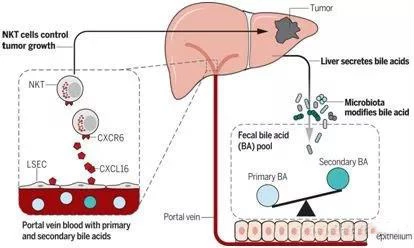Study finds association between intestinal bacteria and antitumor immune responses in the liver

Study finds association between intestinal bacteria and antitumor immune responses in the liver

Copyright © iCell Bioscience Inc, Shanghai 2018-2019
A microbiome is a collection of bacteria and other microbes living in or on the body. In humans, the largest portion of the human total microbial population exists in the intestine. Although extensive research has been conducted on the relationship between the gut microbiome and cancer, little is known about the role of gut bacteria in the formation of liver cancer.
In a new study, researchers from the United States, Germany, and Thailand found a link between intestinal bacteria and anti-tumor immune responses in the liver. It was also confirmed that the bacteria found in the intestinal tract of mice affected the liver's anti-tumor immune function. These findings have implications for understanding the mechanisms that lead to liver cancer and developing methods for treating liver cancer.

In order to study whether intestinal bacteria affect the production of tumors in the liver, the team conducted a series of experiments on mice. Three mouse liver cancer models were used and it was found that mice treated with antibiotics formed fewer smaller liver tumors and reduced tumor metastasis into the liver when the antibiotic mixture was used to eradicate the enteric bacteria.
The researchers used different tumor models to discover that if mice were treated with antibiotics to destroy certain bacteria, then this could change the composition of the immune cells in the liver and thus affect the tumor growth in the liver.
The researchers then studied immune cells in the liver in order to understand how eradicating intestinal bacteria inhibits tumor growth in livers of mice treated with antibiotics. Antibiotic treatment increases the number of immune cells in a group of these mice called natural killer T cells (NKT cells).
Further experiments showed that in all three mouse models, the decrease in hepatic tumor growth due to antibiotic treatment was dependent on these NKT cells. Next, they found that the accumulation of these NKT cells in the liver was caused by the increased expression of CXCL16 protein on the surface of liver sinusoidal endothelial cells located inside the liver capillaries.
Cholic acid is formed in the liver and helps to degrade fat during digestion. When it was discovered that cholic acid (also translated as bile acid) was able to control CXCL16 expression, this was critical. Subsequent further studies revealed that if mice were treated with cholic acid, they could actually change the number of NKT cells in the liver and thus change the number of tumors in the liver.
Finally, these researchers found that a Clostridium species called Clostridium scindens controls bile acid metabolism in the intestinal tract of mice and ultimately controls CXCL16 expression, NKT cell accumulation, and tumor growth in the liver.
Although many studies have shown a link between gut bacteria and immune responses, the importance of this new study is that it not only identifies this association, but also identifies the complete mechanism of how the bacteria affect the immune response in the liver.
In this new study, the researchers found that cholic acid can also control CXCL16 protein expression in human liver, and reported that although these results are preliminary, the new mechanism described in this study may potentially apply to cancer patient.
 Loading ....
Loading ....
